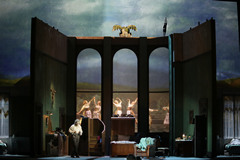| Opera Reviews | 29 April 2024 |
Ildar Abdrazakov is an impressive Méphistophélès in the Mariinsky's Faustby Silvia Luraghi |
|
| Gounod: Faust Mariinsky Theatre, St Petersburg 23 June 2015 |
|
|
Among them this year was bass-baritone Ildar Abdrazakov, who starred as Méphistophélès in Gounod’s Faust under the baton of Maestro Valery Gergiev. Abdrazakov, who shortly before this performance had just finished a round of performances of the same opera in Turin, is a perfect Méphistophélès; very compelling theatrically, he knows how to highlight all the facets of this character while relying on a perfect vocal technique which allows his handsomely colored voice to stand out. The stage director, Isabella Bywater, who designed this production for the Mariinsky in 2013, explained that she conceives the devil as the dark side of Faust himself, and that for her the two are in fact the same person. Accordingly, Faust rises from his bed in the morning, and Méphistophélès rises from the same bed when Faust evokes him. Faust’s workshop is a crumbling room, with peeled paper on the walls. When Méphistophélès promises him all he desires, two identical Marguerites appear from the window: according to the stage director this indicates Faust’s desire to fall in love no matter with whom. In the second act, students, soldiers and villagers sing their drinking song wearing white masks, and the staging suggests that the pub is rather a court, where Faust might be judged for his future misdeeds. The idea of sin and judgment is fundamental to Bywater’s production: the director, who also designed the sets and the costumes, indicated that she viewed Faust as a religious man who only at this point in his life surrenders to his dark side, and feels deeply guilty about this. With the help of light designer Jennifer Schreiver, Bywater set the action in a colorless, grayish setting, which highlighted the banality of sin. In the end, the focus moves from Faust to Marguerite, and her final salvation underlies Faust’s damnation, and Méphistophélès’ basic defeat. In the vocal cast, besides Abdrazakov, soprano Irina Churilova as Marguerite distinguished herself for her vocal capacities and baritone Alexei Markov was a stylish Valentin, and displayed a very interesting voice and nicely timbred voice. On a less positive note, tenor Mikhail Vekua in the title role was visibly at odds with the demanding score, and had problems with intonation in the high range. Maestro Valery Gergiev in the pit conducted a spellbinding performance, which kept the audience breathless until the end.
|
|
| Text ©
Silvia Luraghi Photo © Natasha Razina |

 Over the years, the Mariinsky has been feeding the star system with numerous young singers who have rapidly become internationally acclaimed. Even if their international engagements are keeping them away from St Petersburg, they don’t fail to visit the company during the annual White Nights Festival.
Over the years, the Mariinsky has been feeding the star system with numerous young singers who have rapidly become internationally acclaimed. Even if their international engagements are keeping them away from St Petersburg, they don’t fail to visit the company during the annual White Nights Festival.





